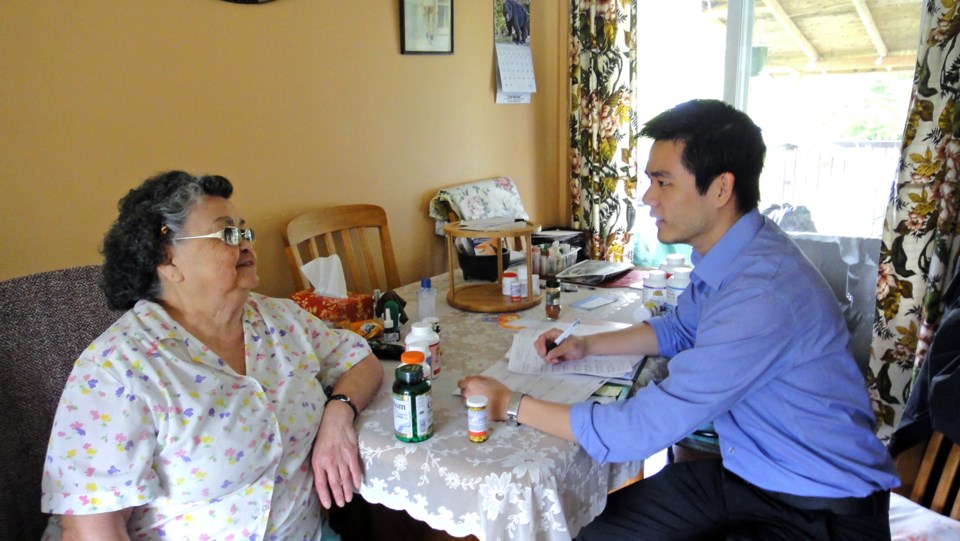When Nuxalk First Nation senior Eva Mack first met Burnaby’s Larry Leung, she came carrying a bag of pills.
The 76-year-old was taking 11 different medications plus insulin shots to help with diabetes, kidney disease, lung disease and heart problems.
She had come to the Bella Coola hospital to see Leung, a recent UBC pharmacy grad, for reassurance.
“I just wanted to make sure that my pills were the right ones I was taking and that I was doing the right thing,” Mack told the NOW in a phone interview. “He was able to go through my whole pill list with me and explain everything about them and even recommend that some I should take more or take less or not take at all.”
Such opportunities to sit down with a drug expert and make sure prescriptions and drug regimens are up to date are very rare – especially in remote aboriginal communities.
Leung and his business partner, Jason Min, are working to change that.
And last month, their pioneering work was recognized with a B.C. Community Achievement Award.
Since 2010 Leung and Min have taken their business, Clinicare Pharmacists, into First Nations communities to dispense, not pills, but information.
It’s a service that’s sorely needed.
Since out-of-the-way communities are often served by only “locum” or temporary doctors, Leung said, residents are sometimes prescribed medications that aren’t reviewed for a long time.
“They just get kind of left on it, and it just gets refilled over and over again,” Leung said. “When that happens, sometimes patients get left on a lot of medications.”
With an aging population and new drugs coming onto the market all the time, expert information about drugs has never been more important.
And Leung, a Burnaby North grad, is part of a new wave of pharmacists who plan to spend their careers giving out that information instead of dispensing drugs from behind a counter at a traditional drug store.
“I think Larry and Jason probably got the idea from where the profession is going,” UBC pharmacy professor Barbara Gobis said, “but the rubber really hits the road when somebody has the courage and the creativity to take an idea and put it into action, and that’s what Larry and Jason have done.”
Leung and Min founded Clinicare during a one-year UBC pharmacy residency the two shared.
Their work in aboriginal communities started in Bella Coola, where Leung had done a rotation working with the town’s lone pharmacist.
Mack remembers him coming to an elders’ luncheon on the Nuxalk reserve asking if anyone would be interested in talking to him about their medications.
“We all put our hands up,” Mack said. “He was a big hit right away.
Clinicare offers the First Nations communities it works with a two-week pharmacy program every six months, with Leung and Min usually piggy-backing their services onto to other specialized collaborative clinics – like foot-care clinics or blood-pressure clinics – or tagging along on home visits with home and community care workers.
“During our first go-around in any community, the biggest thing is probably compliance and unnecessary drugs and expired meds,” Leung said.
It’s “super satisfying,” he said, to help patients sort through old medications and prescriptions.
“I absolutely love it,” he said. “The communities are amazing. The people are amazing, the fact that I get to spend an hour with a patient, talking about their health, talking about how to take your medications properly and then making recommendations to the physician.”
With enough time, pharmacists can also learn about patients’ values and beliefs, something Leung said is just as important as the information he brings to a community.
“If you just tell patients they need to take X, Y and Z, and you don’t take into account anything that they value, those patients are not going to take your recommendations anyway,” he said. “At the end of the day, the patient’s going to be the one who takes it. So what I can do is I can present the evidence, saying this is what the pill will do for you. What do you think? Do you want to take it?”



